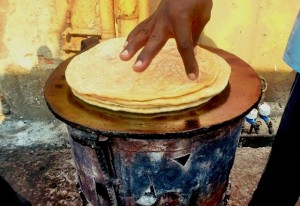Food businesses feel pinch from rising charcoal prices
May 7, 2018—A recent spike in demand from Kenya for Ugandan charcoal has driven up prices for this energy source widely used for cooking and the situation is hurting street side food vendors already operating on slim margins.

Being providers of food, such as chapati for budget spenders, street side vendors are seeing their overhead costs rising sharply in recent weeks.
“The Kenyan government stopped the burning of charcoal in Kenya. This has exerted pressure on our locally burnt charcoal. Tonnes of charcoal are now being exported to Kenya where the market is good for the dealers. This has pushed prices to move up especially towards the beginning of May,” Vincent Magola charcoal dealer told 256BN.
Currently sack of charcoal is trading between UGX75,000 ($20) to UGX95,000 (nearly$ 26) depending on the trading centre, but the trend is causing mounting concerns among people in the informal sector such as local restaurants, chapatti makers and at household levels.
However along the Kenya/Uganda border at Busia, a sack if charcoal has doubled from UGX35,000 ($9.50) to UGX80,000 ($21) and speculation is now rife as people try to exploit the situation.
Towards the end of February this year, William Ruto, the Kenya Deputy President said in a statement, ‘The government has with immediate effect imposed a moratorium on timber harvesting in all public and community forests for a period of 90 days to allow reassessment and rationalisation of the entire forest sector in Kenya,” he said.
Since 1963, Kenya has seen its forest cover shrink from 12% to 7.5% due to illegal logging, charcoal production and human encroachment which together have adversely affected the country’s watersheds.
Soon after the Kenya government move, the Uganda government imposed a ban on the exports of charcoal to its neighbour, but enforcement has been lax and thwarted by the rewards of high profit margins. Sources say a joint effort by the two governments is needed to curb the smuggling. The other fall out of the Kenyan ban, is that Ugandan illegal loggers have found an incentive to risk chopping down even more trees than usual.
However small businesses involved in selling cooked food are not happy with the situation. Moses Okello, a chapati-maker on the outskirts of the city centre said on a daily basis he has been using UGX20,000 ($5.40) to buy charcoal for frying his chapati, but following recent increases, he is now spending UGX30,000. Being a budget meal, Okello cannot easily adjust his prices upwards at the risk of losing customers.
Kenyan food vendors have also seen charcoal prices double, at the moment inching towards KES3000 from KES1,400 before the ban in February.

 Uganda Airlines likely to miss Spirit A320neo delivery slots
Uganda Airlines likely to miss Spirit A320neo delivery slots
 Rolls-Royce Pearl 10X engine takes flight
Rolls-Royce Pearl 10X engine takes flight
 Unpacking results-based financing: balancing strengths with weaknesses
Unpacking results-based financing: balancing strengths with weaknesses
 Big fish in small pond Stanbic notches up $100m profit for 2023 topping previous figure by 15%
Big fish in small pond Stanbic notches up $100m profit for 2023 topping previous figure by 15%
 Uganda, Nigeria explore deeper economic cooperation
Uganda, Nigeria explore deeper economic cooperation
 CAA grants Uganda Airlines Approved Maintenance Organisation certificate
CAA grants Uganda Airlines Approved Maintenance Organisation certificate
